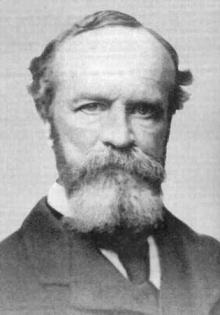January 11: William James
William James (1842)
It was on this date, January 11, 1842, that American psychologist William James was born in New York, the son of a Swedenborgian theologian, Henry James, Sr. Emanuel Swedenborg was the 18th century Swedish mystic who entered ecstatic trances, claimed to have therein visited heaven and hell, but was found by his contemporaries to be sane and sensible. In modern analysis, his trances have been explained by a severely repressed sexuality.
James's father was a minister of a Swedenborgian sect — a religion now subsumed in the Church of the New Jerusalem — which may explain why William James, throughout his life, possessed an unrequited yearning for some sort of religion. James earned an M.D. degree, taught anatomy and physiology from 1872, and became professor of philosophy and psychology, at Harvard University in 1880, remaining there until 1907. His chief psychological publications were his Principles of Psychology (1890) and Textbook of Psychology (1892). The most significant contribution James made to the science of psychology was ridding it of the metaphysical elements with which it was traditionally tainted.
James also wrote Pragmatism (1907) a philosophical school he co-founded independently of Charles S. Peirce, and A Pluralistic Universe (Hibbert Lectures, 1909). In A Pluralistic Universe, James denies the superiority of monotheism, and concludes that at the most we may admit the existence of a number of unknown spiritual beings. In his Ingersoll Lecture, Human Immortality (1908), James says, "my own personal feeling about immortality has never been of the keenest order." Furthermore, he says, "The vast literature of proofs for God's existence drawn from the order of nature, which a century ago seemed so overwhelmingly convincing, today does little more than gather dust in our libraries, for the simple reason our generation has ceased to believe in the kind of God it argued for."[1]
This echoed his sentiment in a 1904 letter:
My personal position is simple. I have no living sense of commerce with a God. I envy those who have, for I know the addition of such a sense would help me immensely. The Divine, for my active life, is limited to abstract concepts which, as ideals, interest and determine me, but do so but faintly, in comparison with what a feeling of God might effect, if I had one. ...I have grown so out of Christianity that entanglements therewith on the part of a mystical utterance has to be abstracted from and overcome, before I can listen. Call this, if you like, my mystical germ. It is a very common germ. It creates the rank and file of believers.[2]
Later in the same work, James muses about the Bible, saying, "It is so human a book that I don't see how belief in its divine authority can survive the reading of it."[3] The work for which James is chiefly known is yet another example of his search for transcendental meaning in life, Varieties of Religious Experience (1902). Christian writers swoon over his words, but in several places James expresses profound skepticism:
Religion, in short, is a monumental chapter in the history of human egotism. ... A new sort of religion of nature... has entirely displaced Christianity from the thought of a large part of our generation. ... Religious experience, in other words, spontaneously and inevitably engenders myths, superstitions, dogmas, creeds, and metaphysical theologies, and criticisms of one set of these by the adherents of another.[4]
His search for meaning through religious experience turned up empty, so that biographer Bernard Brennan was compelled to note, "James declared that, far from ever having had a mystical experience, he actually found it impossible to pray; but he envied those gifted to do so."[5] James died on 26 August 1910 in Chocorua, NH. It was William James, brother of novelist Henry James, who said, "An external Creator and His institutions may still be verbally confessed in church in formulas that linger by their mere inertia, but the life is out of them, we avoid dwelling on them, the sincere heart in us is elsewhere."[6]
[1] Ingersoll Lecture, Human Immortality, 1908; quoted in James A. Haught, 2000 Years of Disbelief, New York: Prometheus Books, 1996. [2] Bernard P. Brennan, William James, New York: Twayne's V.S. Author Series, 1968, pp. 99-100; quoted in Haught (op. cit.). [3] Ibid. [4] William James, Varieties of Religious Experience, 1902. [5] Bernard P. Brennan, William James (New York: Twayne's V.S. Author Series, 1968), p. 99; quoted in Haught (op. cit.). [6] Ingersoll Lecture (1908), quoted in Haught.
Originally published January 2004.


